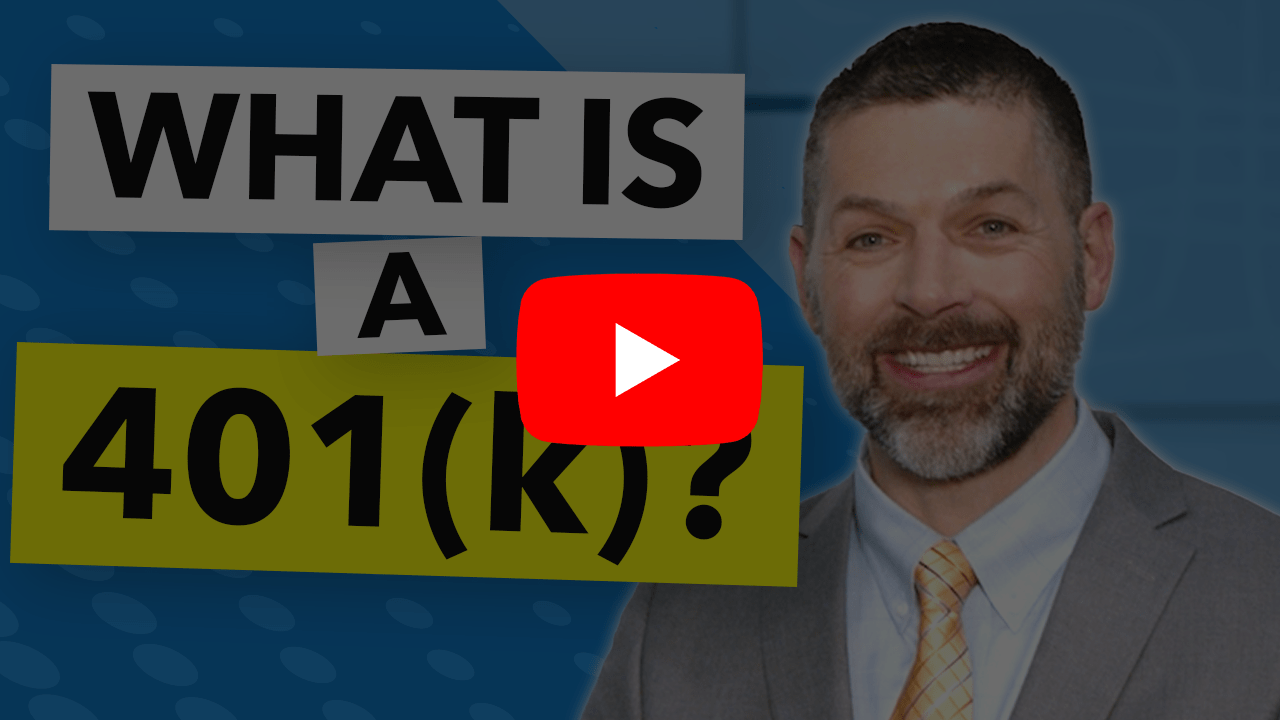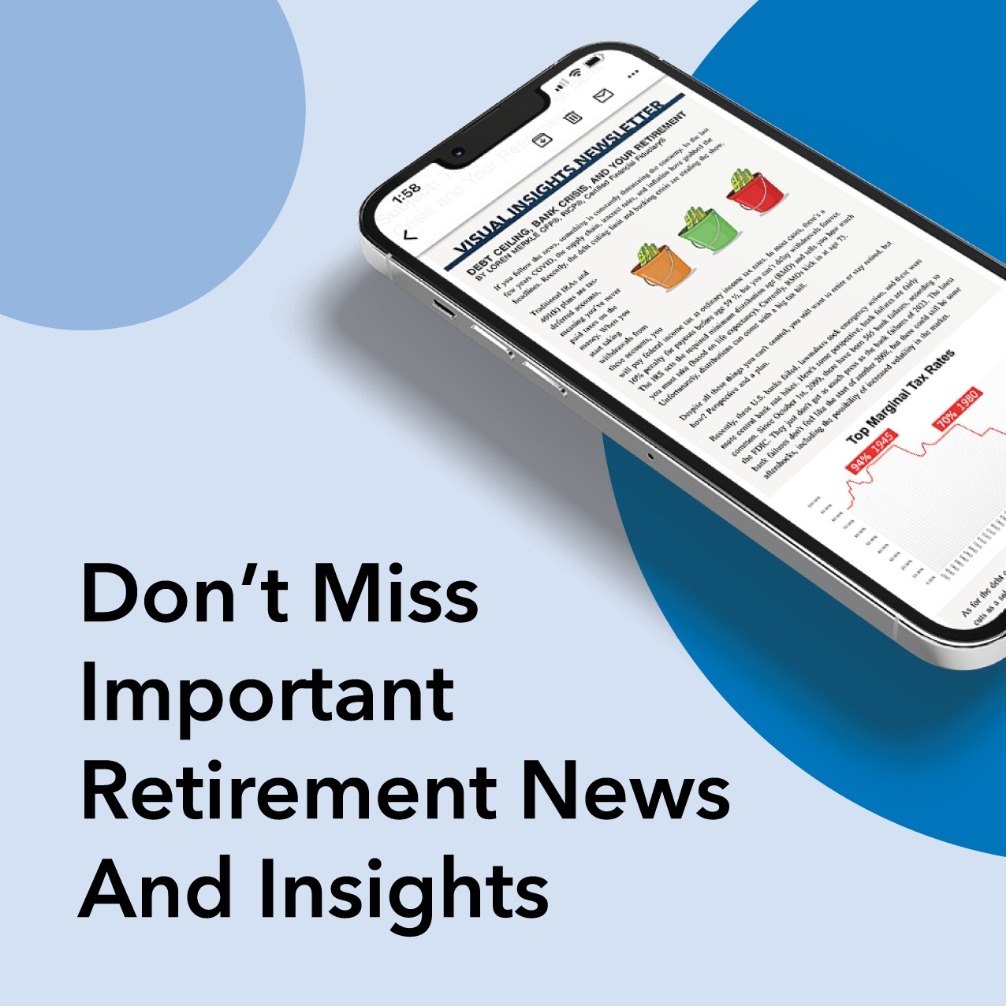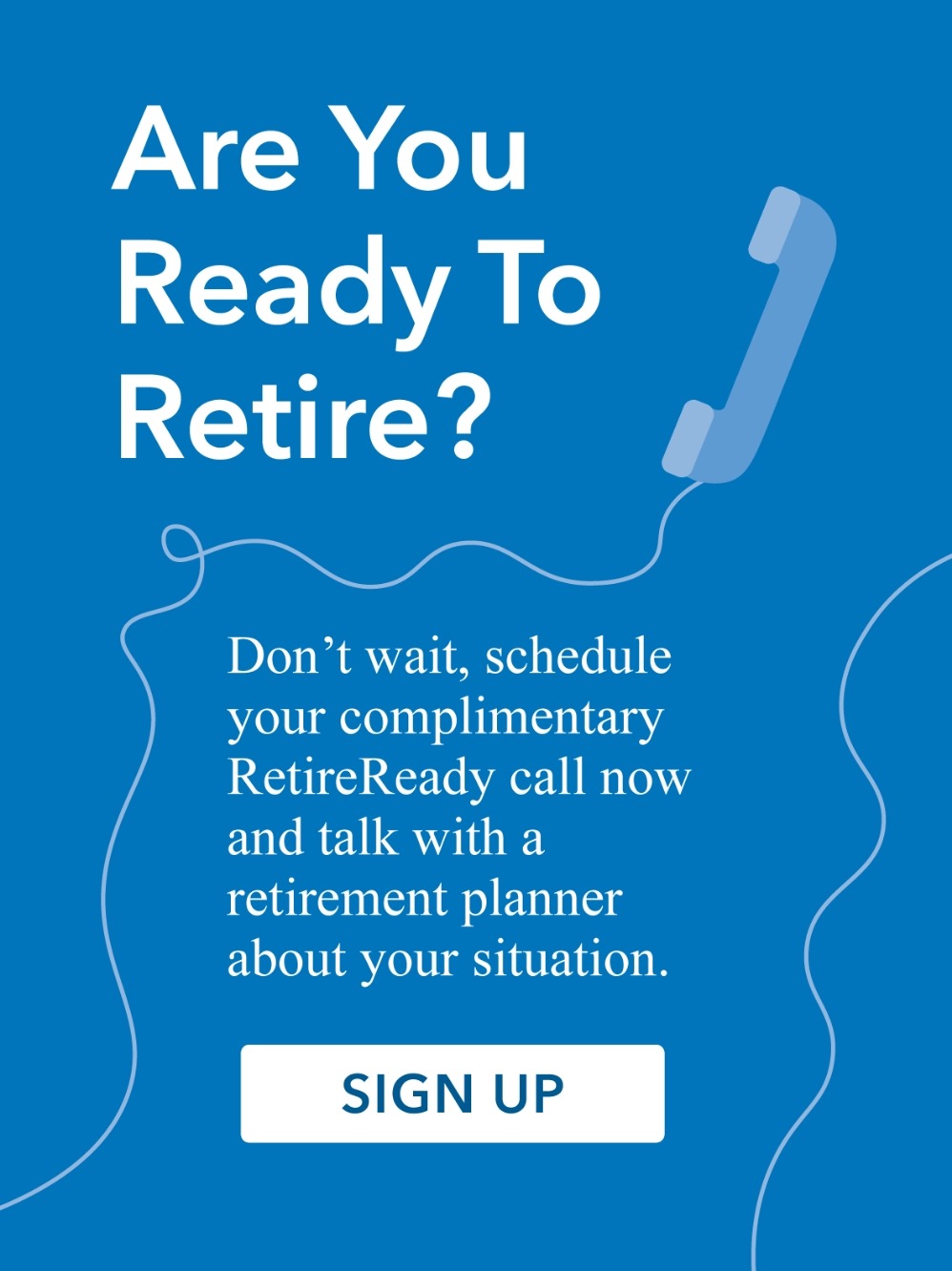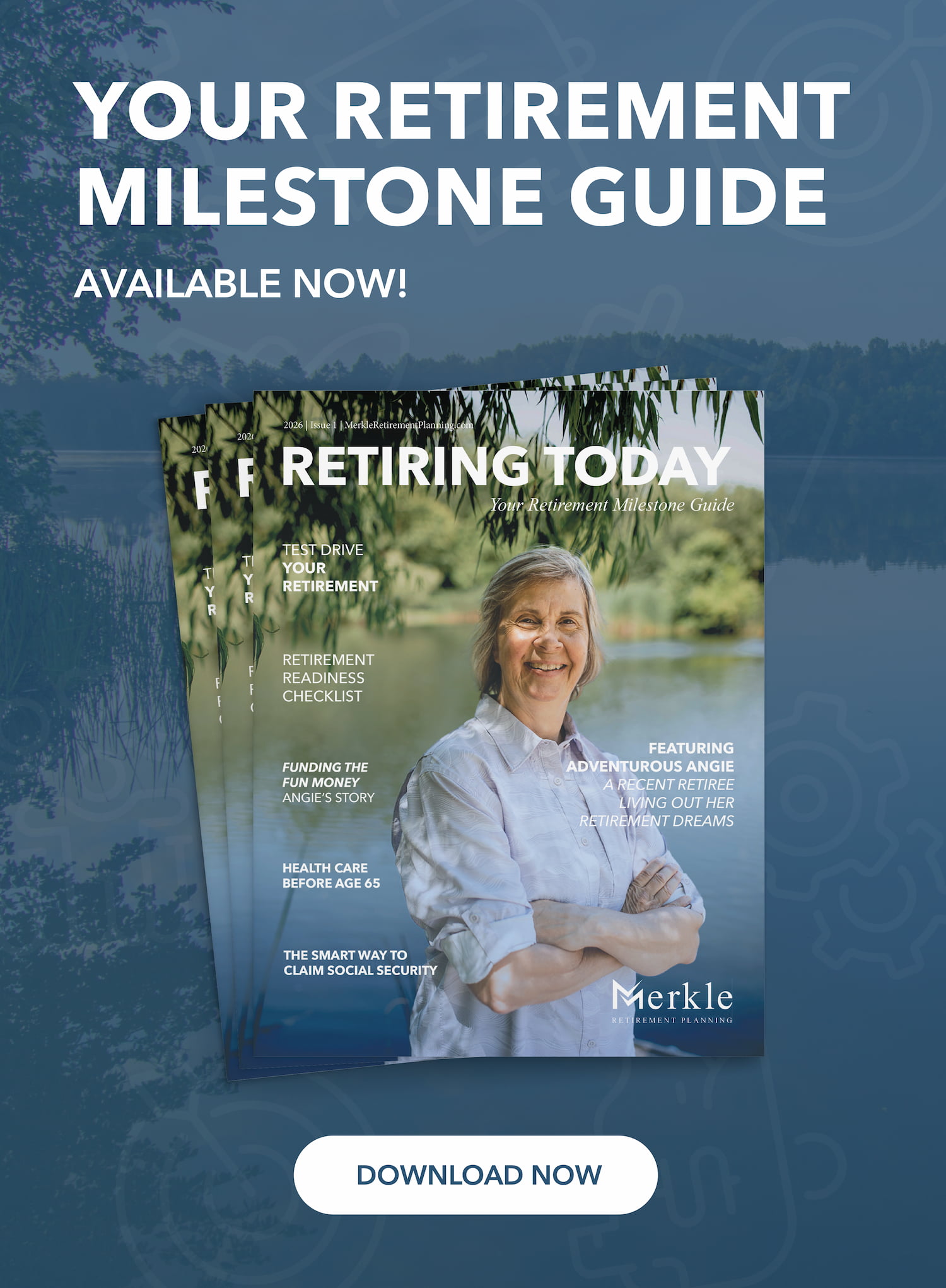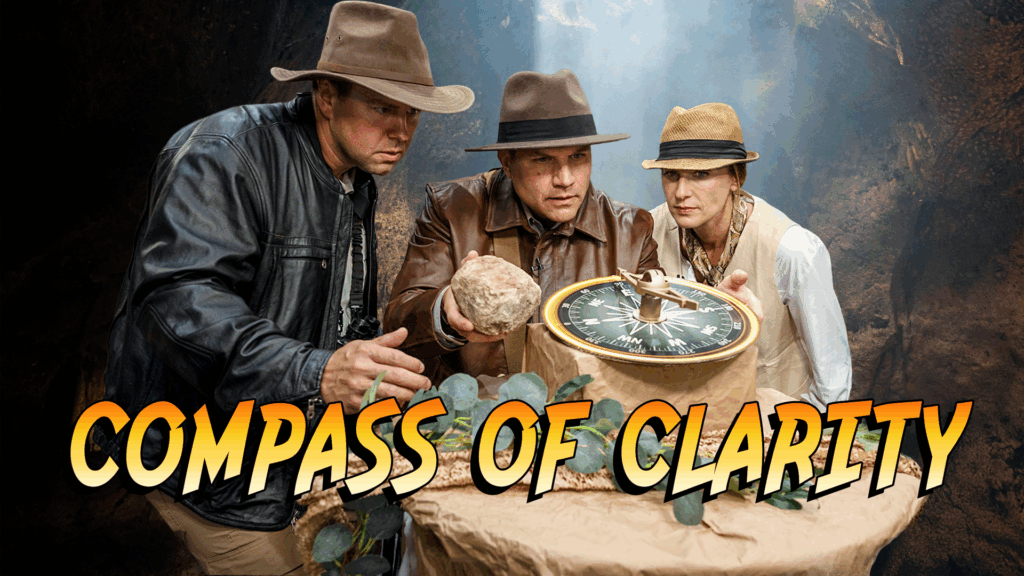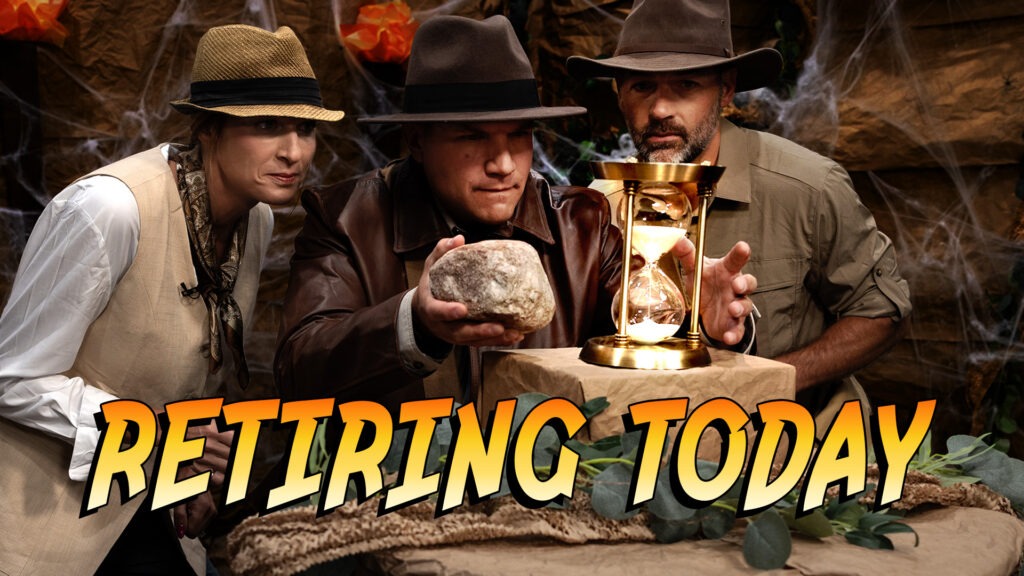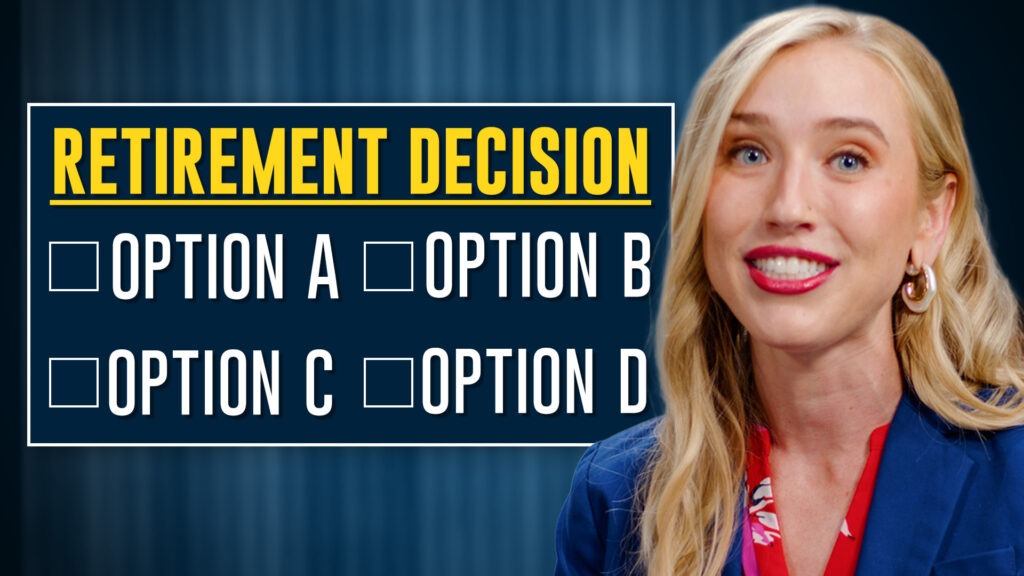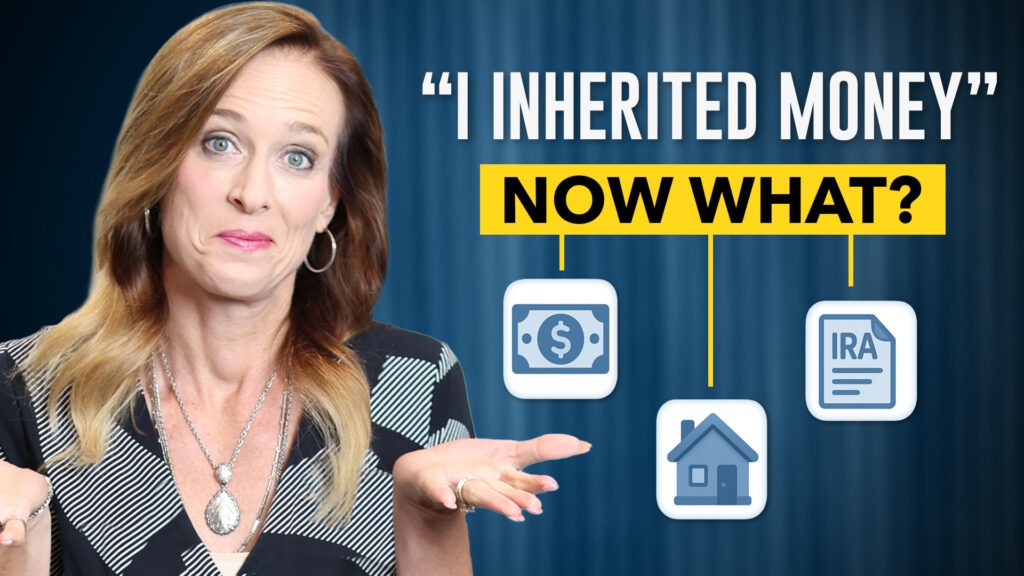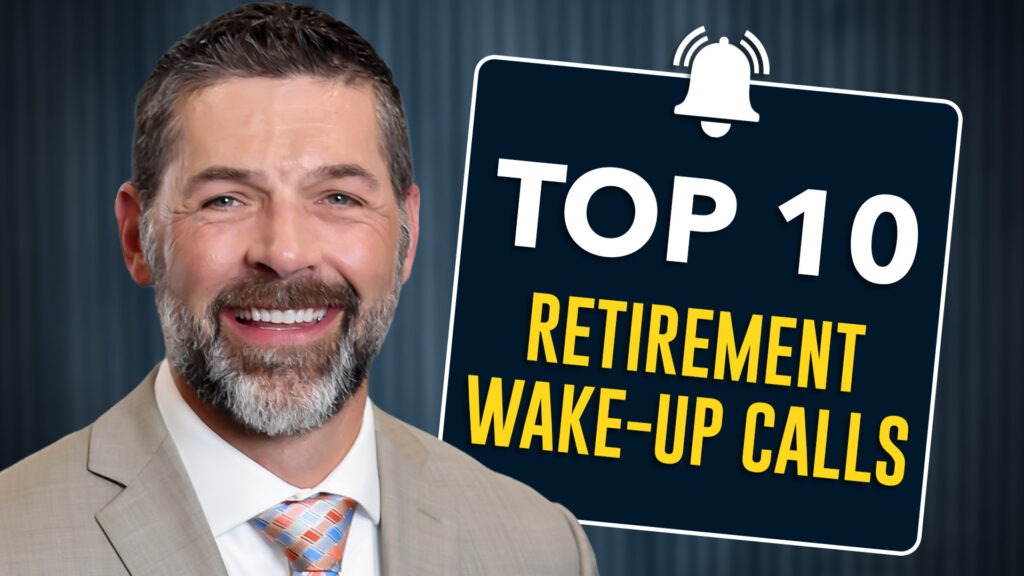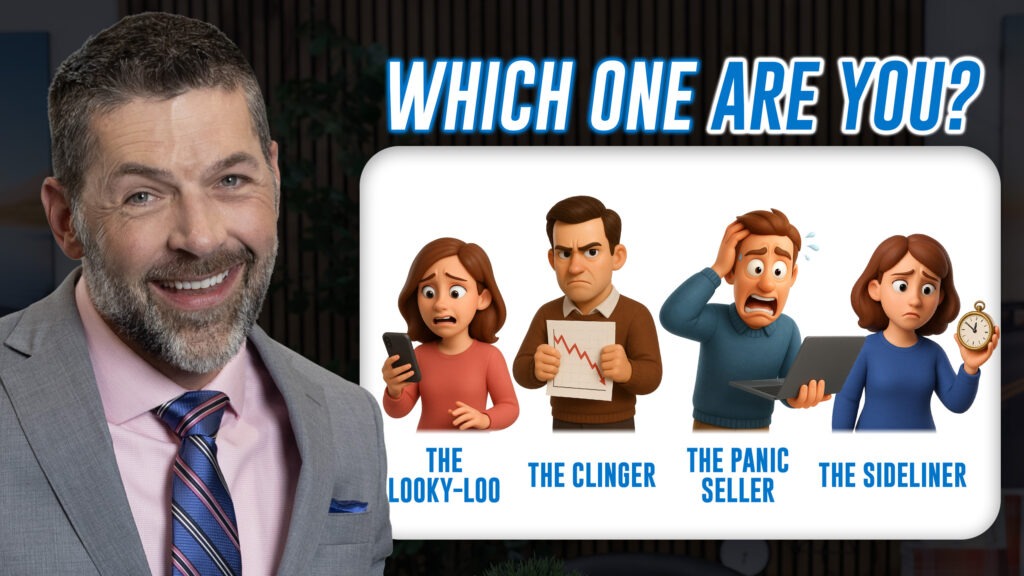Discover the ins and outs of your 401(k) and its role in your retirement plan. Retirement Planners Loren Merkle and Chawn Honkomp dive into what a 401(k) is and, more importantly, what it isn’t. They cover:
– The difference between a 401(k) investment account and a comprehensive retirement plan.
– Understanding your 401(k)’s benefits, including the employer match and tax advantages.
– How to evaluate and manage the risk in your 401(k) as you approach retirement.
– Options for gaining control over your 401(k) at age 59½ without incurring penalties.
–––––––––––––––––––––––––––––––––––––––––––––––––––––––––––––––––––––––––––––––––––––––––––––
TRANSCRIPT
Molly Nelson [00:00:01]:
Isn’t my 401(k) a retirement plan? It’s a common question. Today, we talk about what a 401(k) is, and what it isn’t, right now on Retiring Today. This is Retiring Today. I’m Molly Nelson, here with Loren Merkle and Chawn Honkomp. They are both CERTIFIED FINANCIAL PLANNERS™ and Certified Financial Fiduciaries®. Chawn is also a CPA. So today, guys, we want to talk about the 401(k). Loren, it’s a common retirement savings, what should we call it – vehicle? Retirement savings account?
Molly Nelson [00:00:41]:
Investment account. But a lot of times, it gets called a 401(k) plan, which can be a little confusing for the message we have today.
Loren Merkle [00:00:49]:
It’s really confusing. And a lot of times, we will even reference the 401(k), not as a 401(k) investment account, but as a 401(k) plan. The confusion often comes into play when people get closer to retirement, and they have to make a whole bunch of decisions that they’ve never had to make before. And they really start to realize there’s a lot more to a retirement plan than just the investments like the 401(k) plan.
Molly Nelson [00:01:15]:
And a 401(k) is a good thing. We are not here today to bash a 401(k) plan because if you’re fortunate enough to have one, you know that there are a lot of advantages to it. Chawn, let’s name some of them just to make sure that people know we are in favor of 401(k) plans.
Chawn Honkomp [00:01:29]:
Yeah. The great advantage often is this is where people start. So, if people didn’t get started, they might not otherwise start. So, a lot of employers offer 401(k) plans that you want to get signed up and start participating. Most employers will provide a match. So now that along with your contributions, you’ll get that employer match. And that’s what we’re trying to do, is we’re just trying to build and accumulate that at that stage of life.
Molly Nelson [00:01:51]:
Yeah. And 401(k)s are a great way to get started. And you put the money away. And in those early years, Loren, you don’t pay taxes on that money. So that’s kind of an advantage again, in those early, early working years.
Loren Merkle [00:02:03]:
And we’ve never had more options with the 401(k) plan as what we have right now. For ever, in the 401(k) plan, your main contributory option was to put money away pre-tax, which means you don’t pay taxes on that contribution. It continues to grow tax-deferred. Eventually, when you take it out, you owe taxes on it. So what people have been doing is they’ve been building their retirement tax bill as they build their retirement account their retirement tax bill has also been growing and people are retiring and figuring out they have to pay a whole lot of tax on this money that they’ve saved. And it may not be quite the deal that they thought it was. So now you have the option in many 401(k)s or 403b plans to not only contribute pre-tax like we just talked about but also contribute to the Roth 401(k), which means the money goes in after tax. The money then grows tax-free. So when you take it out after age 59 1/2 or at 65, whenever you do retire, that money comes to you tax-free. So you don’t have this huge retirement tax bill that you once had through contributing on the pre tax side.
Molly Nelson [00:03:09]:
Yeah. And the guise of trying to teach people things. If they have the Roth 401(k) option available through their employer, which not everyone does, should they automatically do that? Should they put part of their money into that? Should they do that later in their career? What’s the tip or teaching moment here?
Loren Merkle [00:03:23]:
This is where the retirement planning comes into play with the 401(k) investment account. Some people, it does make sense, contribute to the pre-tax side because you’re in a higher tax bracket now than you may be in retirement. For a lot of people, however, it makes more sense from a tax standpoint to contribute to the Roth side because in retirement, if you don’t, you could be in a lot higher tax bracket than what you anticipate being. Or maybe it’s a combination; it doesn’t have to be one or the other. Some people contribute some money to the pre-tax and then to the Roth, which is different for everybody. And this is where the customization of your retirement plan should come into play.
Molly Nelson [00:04:03]:
And that’s what we’re getting at today is that yes, a 401(k) is a good thing, but I’m going to go ahead and answer the question: is my 401(k) a retirement plan? No, it’s not. And we’re going to tell you why today, because there’s, like you said, all those moving parts and things are different as you get close to retirement. So we want people to learn something, Chawn. So you’ve got a great tip and a good way to illustrate how when you get closer to retirement, that 401(k) and how you think about it needs to change.
Chawn Honkomp [00:04:25]:
Yeah, we know these 401(k)s are so common and that’s where a majority of retirement savings is accumulated. So it’s important that you’re very intentional about your 401(k). So let’s think about it; we want to help you think about and know what tips you should be thinking about and how you can maximize that 401(k). And let’s look at that through the eyes of Jill. So Jill, when she’s age 30, her primary focus is simply on that 401(k). She knows she wants to get signed up, start putting that money in, get the employer match, and let the 401(k) do its thing, with the primary purpose simply to help Jill accumulate for retirement. Some time goes by, and Jill wakes up. Jill is now age 57, and you can see her retirement. Her focus has really shifted from strictly the account itself to now a bigger retirement focus. At age 57, she knows retirement’s just around the corner.
Chawn Honkomp [00:05:15]:
The years have gone by, and the next five to ten years for Jill are going to go by fast, and she’s going to be on the doorstep of retirement. So, at age 57, it’s an extremely important time to evaluate your risk. You might have made some decisions like Jill when she was 30, and maybe you haven’t looked at it since then, but as those years go by and you get closer to retirement, it’s a tremendous opportunity for you to evaluate that risk. And a big takeaway from this is just knowing the investments that you have. That doesn’t tell you the risk that you’re taking. You will know what you own, but that doesn’t correlate and tell you whether or not that investment is aggressive or conservative. So you want to be very intentional about how you’re investing and take this opportunity to evaluate exactly what you’re doing in your 401(k). And for most of you out there, you’re going to have three different ways that you can evaluate this 401(k) risk.
Chawn Honkomp [00:06:11]:
One way is to call the 401(k) plan advisor. Most 401(k)s out there have an advisor that represents that plan. They are compensated to be a resource for you as a participant. So, you have the opportunity to reach out to that plan, spend some time with that advisor, and do some analysis. Look at the specific investments you’re using, look at the other investment options that are offered for that 401(k) and determine if now is the right time for you to make some changes to how you’re investing in your 401(k). A second way is to reach out and call your current advisor. So, if you have established an advisor relationship at some point in your lifetime, now’s a great time to leverage that relationship and potentially get a little bit more out of that relationship. You might be using that advisor maybe for some outside money or maybe for life insurance or other life events.
Chawn Honkomp [00:07:03]:
Now’s a good time to connect with them and make sure that what you’re doing with everything they’re helping you with aligns with what you’re doing over in that 401(k). Again, have a better feeling for how much risk you’re taking in your 401(k). And a third way for you is to start a relationship with a retirement planner. So, one takeaway you might have, as you see some of these these two options, is your current advisor and retirement planner. That should tell you that not all advisors do the same thing. So, as retirement planners, we are helping the families and individuals we work with all the time. Look at their entire picture. We might be helping them manage a portion of their retirement savings in IRAs.
Chawn Honkomp [00:07:41]:
They might still have some; you may still have some of your retirement savings in your 401(k). Our process includes looking at that entire picture and giving you more information, helping you be more intentional about how you’re investing with your IRAs, along with how you’re investing in your 401(k). And what you wanna do is make sure that what you’re doing is aligned and you have a great understanding of exactly how much risk you’re taking across your total portfolio. It’s important to be intentional. That’s the big thing. Get more information as we get into this pre-retirement stage of life.
Molly Nelson [00:08:13]:
Okay, so I have an understanding of what I should do to get an evaluation of my risk. But I don’t understand, Loren, why I should care about risk so much as they get closer to retirement.
Loren Merkle [00:08:22]:
The value of your 401(k) plan is going to be largely dependent upon the types of investments you’re using underneath it and then how those investments react. And those investments are going to react to most, most of the time, the bond markets and the stock market. So the amount of risk you take in your 401(k) plan will determine when we go through really bad times in this market, the bond and stock market, like 2022, how much is your portfolio going to be down? Then, the questions that need to be asked are: Are you comfortable with that movement of your portfolio? And maybe even a more important question is, is that downward movement of your investments, is that going to upset what you’re trying to accomplish? From a retirement planning standpoint, if you have a million dollars in your 401(k) plan and you lose $300,000 of that million, and you’re two years away from needing that money to live on for retirement, will that impact your retirement?
Molly Nelson [00:09:14]:
Yes, most likely it would impact most people’s right?
Loren Merkle [00:09:16]:
In many cases, that’s what happens. And we saw that every time we go through a bad time in the market we see that 2008 is one of the biggest times that we saw where people had to come out of retirement because they lost 50% to 60% of their life savings in a short period of time, or they had to push their retirement time frame back because they lost so much money. That is why the amount of risk in your 401(k) plan is so important. Important. And the importance of it is even greater the closer you get to retiring.
Molly Nelson [00:09:46]:
We’ll continue talking about your 401(k) and why it’s not a retirement plan, next.
Voice Over [00:09:55]:
You dream of a happy retirement. But there are some big questions to answer. First, do I have enough saved? When should I take Social Security? How will I pay for health care and keep up with inflation? Go to MerkleRetire.com to schedule a 15 Minute Retirement Check-Up Call to talk directly with a retirement planner and get answers to your important retirement questions. The first step to your retirement starts with a 15 Minute Retirement Check-Up Call.
Voice Over [00:10:26]:
Anytime I have even the smallest question about my accounts or what effect the latest tax law might have on my situation. The Merkle Retirement Planning team is always there and quick to help. I’m so glad they treat you like, well, like family. I’m so happy to have such an excellent team working for my future and ensuring I do the best to achieve my financial goals.
Voice Over [00:09:45]:
Merkle Retirement Planning. Your retirement starts here.
Molly Nelson [00:10:58]:
Welcome back to Retiring Today, I’m here with Loren Merkle and Chawn Honkomp. Loren, you just talked about someone losing $300,000. And I want to go back to that because I think if you were listening, you thought, I don’t want that to happen to me. So let’s make sure, again, it’s crystal clear. So let’s say Jill does one of the three things that Chawn just talked about. Will someone spell it out for her and say, you could lose this much money out of your portfolio? How does it correlate?
Loren Merkle [00:11:22]:
It’s this risk conversation where a lot of confusion can really come into play. Let’s go back to the $1 million dollar, $300,000 example. Let’s say we all have a million dollars in our 401(k) plan. All right, that’s good. We all agreed that we wanted to be moderate. We wanted to take a moderate amount of risk, and we go through a really bad time in the market, and we are all down $300,000. Now, I might be evaluating my 401(k) plan. Say, yeah, that’s about moderate.
Loren Merkle [00:11:51]:
I feel good – feel okay about that. I mean, nobody wants to lose $300,000 but when you take risk, you know you’re going to be down. And I’m feeling that’s kind of on par with what I would consider moderate. You’re sitting there thinking $300,000, that’s not moderate at all. That feels a lot more aggressive. And I never, never knew that I could be down $300,000 and you’re feeling like, well, that’s no big deal. Actually, I could be down way more than that.
Loren Merkle [00:12:14]:
That type of language, conservative, moderate, aggressive, that’s very subjective language. That could mean something different to everybody. So, when we talk about portfolios and when we measure risk, we measure it in a numerical way. So our evaluation of portfolios is you have a million dollars based on how it’s currently invested. If we go through a really poor twelve-month cycle in the market the way it’s invested, you could be down $200,000. How do you feel? And if you’re comfortable with that, then that’s a good starting point. If you’re taking too much risk, you don’t feel comfortable with being down $200,000, then you can do something about it. So you’re not going to be down $200,000.
Loren Merkle [00:12:54]:
Or if you want to take more risk, then you know that you can. So that, that using $200,000 as opposed to conservative, moderate or aggressive is not subjective and it’s a lot better way for people to dial in the exact type of risk they want within their portfolio.
Molly Nelson [00:13:10]:
And that’s the advantage, Chawn, of maybe a retirement planner. And we don’t know for sure that your current advisor wouldn’t do that. We don’t know for sure. I suppose that I’m looking at those three options again, that the 401(k) plan advisor wouldn’t do that. But most people are familiar with those moderate, conservative…
Loren Merkle [00:13:25]:
Yeah, it’s just a different way of talking about risk in your portfolio. So, if you are having conversations with your 401(k) plan advisor or your current financial advisor, and you’re not having conversations in that way, this is a conversation that you should be having. Let’s get away from the conservative, moderate, aggressive type of talk, and let’s really pinpoint how much risk from a dollar amount standpoint you’re taking in your portfolio. And there are so many different benefits that come with the conversation that develops this way. And one of the biggest benefits is there’s very little surprise. One of the hardest things about going through downtimes in the market is when your portfolio is down $200,000 and you don’t know you’re taking that kind of risk, that is a huge surprise. And then the next thing you’re thinking is, when is the bleeding going to stop? It’s down $200,000 now. Is it going to continue to go? How is your portfolio going to continue to react? Taking away those surprises and creating more awareness around the real risk in the portfolio is the only way to go, especially as you get closer to retirement.
Molly Nelson [00:14:27]:
And if someone watching is listening to the numbers that Loren is talking about and they don’t know if $300,000 is too much or enough for them, if you sit down with a retirement planner, Chawn, they can help you identify what level of risk might be appropriate based on some of your other retirement savings or your retirement vision.
Chawn Honkomp [00:14:44]:
Those conversations are extremely helpful. Until you go through something like that, you don’t necessarily know. And at a certain stage of life, when you are 30, that 401(k) advisor might be the best resource for you. They know the plan. You’re just looking to get in there and get involved. They might have some of your IRA money, and they’ll be able to look at your 401(k) and give you a better sense. But now we know later stages of life, and we get into that pre-retirement stage of life. The most important thing is for you to be intentional.
Chawn Honkomp [00:15:16]:
Nobody cares about your money more than you do, so you want to be very intentional about what you’re looking for and get as much information as you can. And that’s a big part of our process. So we go through that process looking at everything, whether we’re managing those retirement savings or not directly, we’re trying to look at that entire picture. Now, with the resources and the tools that we use, we can put all of your retirement balances there. We can. We know exactly what you own. That allows us to understand and know exactly what level of risk is being taken on a total portfolio. Now that we know that level of risk, that’s where we can give you that information. We can have this conversation with you and say, all right, if we have a very poor market, here’s how much you could potentially expect to go down.
Chawn Honkomp [00:15:59]:
If we have a very strong market, here’s how much you could potentially expect to go up. The up is great, right? It’s the down. That’s where that brings risk into a retirement plan. So we need to focus on that. Let’s have a better understanding of what kind of volatility we expect to potentially incur in a down market. And now we can use that information to help you make better decisions. It still comes down to being intentional. Let’s have more information. Let’s be very intentional about what kind of investment decisions you’re making as you design that overall portfolio.
Loren Merkle [00:16:27]:
And there is so much that goes into retirement planning; sometimes, people don’t really know where they should lie from an overall risk standpoint. And that’s where our planning process can really help them determine what is too much risk and what is too little risk. And that’s really our job when it comes to the risk conversation is, let’s say, based on your entire plan, how much income you need when you retire, the income resources that you do have. You can’t take any more risk than this because when things go south, it’s going to blow up your retirement plan. Or you should take at least this amount of risk because you need to have this type of growth to achieve your retirement goals. So here’s your spectrum of risk. Not more than this.
Loren Merkle [00:17:03]:
Not more than this. Anywhere in here is. Okay. Now, where do you feel the most comfortable? And that type of conversation through our planning process makes that decision a lot easier for most people.
Molly Nelson [00:17:14]:
Today, we’re talking about the 401(k) and why it’s not a retirement plan on its own. And another thing I think that helps kind of illustrate that point, guys, is that the 401((k) has a lot of rules around it – there’s contribution limits – that alone is not a retirement plan because of some of those limits.
Chawn Honkomp [00:17:32]:
Yeah, you’ve got to follow the rules. So, a 401(k) plan is an approved or qualified plan in the eyes of the IRS. They set contribution limits. You know, there are match limits. So we want to try to be aware of that, and obviously use it to its maximum. So, like in 2024, we know that each individual can put up to $23,000 into that 401(k). If you’re over age 50, you’re able to put an additional $7,500. So now we’re over $30,000 or right at $30,500 of total contribution.
Chawn Honkomp [00:17:57]:
So, we want to be aware of these 401(k) rules. We want to use them in, in the best way possible.
Molly Nelson [00:18:04]:
And Loren, that money is essentially, in a way, kind of tied up until a certain age.
Loren Merkle [00:18:10]:
When you put money into a 401(k) plan, essentially, you’re making a deal. You’re making a deal with the IRS. And if you contribute pre-tax, that deal is, you’re not going to touch this money till at least 59 1/2 in most cases. And that money is going to grow tax-deferred. And then you take it out, you’re going to pay the taxes on it. If it’s in the Roth, the deal is you’re not going to touch this money till at least 59 1/2. In most cases, when you take it out, it’s going to come to you tax-free.
Loren Merkle [00:18:36]:
So 59 1/2 is a reason for many people to celebrate, because now, in most cases, this is still very plan dependent. But in most cases, most plans will allow you, even if you’re still working, to take money out from the 401(k) plan, not have to pay a penalty on it, and roll it over into your own account, underneath your name, your control, with literally just about any type of investment option you want to. However, that 59 1/2 timeline for most people is very important.
Molly Nelson [00:19:04]:
Okay, so we’re focusing a lot on the 401(k) today. And again, if you have a 401(k), that’s a good thing. That’s a good way to get started at retirement savings. And people are probably, again, still thinking, I’ve got that. That’s good. But a good way to see that no matter what you’re doing, as far as planning for retirement, there’s more to think about. It is the online Journey to Retirement workshop.
Loren Merkle [00:19:22]:
In the online Journey to Retirement workshop, we have a hypothetical couple, John and Sue. They’re 62 years old. They want to retire in three short years, and they have very specific retirement goals that they want to accomplish. One of the benefits of that online Journey to Retirement workshop is we show you the strategies that John and Sue implement to achieve their specific goals. Now, your goals might be a little bit different, but that’s okay. The strategies, the tactics that John and Sue used you can use to help you accomplish what you’re trying to accomplish from an overall retirement planning standpoint. And it’s very simple to watch. You can consume that information from the comfort of your own home and take in all the information to help you on your journey to retirement.
Molly Nelson [00:20:04]:
You’ve got to meet John and Sue. Here’s how. Go to RetireWithMerkle.com. The information’s on your screen right now. There’s a QR code there, too. Remember, you can open up your phone, open up the camera, and hover over the screen right now. Go to RetireWithMerkle.com. Choose a time and a date that works for you, and you can go to our online Journey to Retirement workshop for more on why a 401(k) isn’t a retirement plan next.
Voice Over [00:20:29]:
Do I have enough saved for retirement? When should I take Social Security? Which Medicare option is best? How do I plan for inflation? Sometimes, the road to retirement starts with more questions than answers. We’re here to help. Join us for our upcoming Journey to Retirement workshop. Get answers and start your retirement journey with confidence. Our online workshop includes information on Secure Act 2.0 and changing retirement rules. Go to RetireWithMerkle.com to register for an upcoming workshop. Your retirement journey starts now.
Voice Over [00:21:01]:
The Merkle Retirement Planning team provides personable and professional expertise unrivaled in this area. They include us in every step of the planning process. The peace of mind provided to us by the Merkle team allows us to fully enjoy this special time of our lives. Instead of feeling snake bit, we feel confident that with the Merkle Retirement Planning team at our side, we can navigate any challenge that comes our way.
Voice Over [00:20:59]:
Merkle Retirement Planning, your retirement starts here.
Molly Nelson [00:21:28]:
Welcome back to Retiring Today, I’m here with Loren Merkle and Chawn Honkomp, and we’re talking about why your 401(k) isn’t a retirement plan. It’s a great savings vehicle. And I keep using vehicle. Is it a car you get in it, you could drive it.
Chawn Honkomp [00:21:51]:
You could use it to buy a car.
Molly Nelson [00:21:52]:
A really nice car, right? So let’s go back to that concept of putting that money into your own name and into your own control because that might be kind of new for some people who are thinking, oh, my 401(k) is my retirement plan.
Loren Merkle [00:22:03]:
For most people, their 401(k) investments represents the bulk of their retirement savings. So, you want as much control over the bulk of your retirement savings as you possibly can. The 401(k) plan is not designed for you to have maximum control. In fact, it’s actually designed for you to have less control when it comes to the investment options. There are very few investment options underneath most 401(k) plans, especially if you’re looking to be more conservatively positioned underneath your investments. The 401(k) plans, most of them offer a stable value account and maybe a couple of different bond funds and maybe some target date funds that will get more conservative, but that’s about it. So you’re very limited, especially in the conservative investment options. The employer owns the 401(k) plan; you own your money, but the employer owns the 401(k) plan, which means they make the rules around that 401(k) plan; them and the Department of Labor essentially make those rules. You just have to follow them. You want the most control over your retirement money as you can. And that’s why the 401(k) plan is more designed for contributions, not designed to house most of your retirement money.
Chawn Honkomp [00:23:12]:
So, it’s great to focus on using it for what it’s intended for. Put the money in there and accumulate it while you’re working. But now, when you get to this later stage of life, when you can get control, we stress that let’s get control of it. You mentioned that in most 401(k)plans, 20 to 30 options you get to an IRA, the universe, and the entire stock market are available to you.
Molly Nelson [00:23:30]:
And for most people at 59 1/2, is that the earliest they can do this? I think what they call an in-service withdrawal.
Loren Merkle [00:23:36]:
If you’re still working for most people for the bulk of their money, the 59 1/2 is there; of course, there are some exceptions. There are always exceptions to every rule. But for most people, 59 1/2 is that time frame where you can still work with that employer but then take control over your money. And if you do it right, it’s not a taxable event. You just shift it from the 401(k) plan over to an IRA, which is underneath your name, your control. Now, for most people in a lot of situations, that does make sense, but that is not a blanket recommendation. So before you do that, you want to make sure it does work for you. It is your right strategy because there are some cases for some people where that doesn’t make the most sense.
Molly Nelson [00:24:15]:
So what I think I’m hearing, Loren saying, Chawn, is the 401(k) is great for saving and investing, but spending out of it in retirement for most people isn’t usually the best recommendation.
Chawn Honkomp [00:24:27]:
Oftentimes, people are thinking, well, this is just a seamless transition. I’ve put all my money here, and now I’m going to retire. I’m just going to gradually take all my money out. But what we find out with 401(k) plans is it may not be as easy as you think. A lot of 401(k) plans don’t necessarily allow you to just set up that regular monthly distribution like we do with most of the retirement families we work with out of the IRAs. We control that. We set up those monthly distributions. The 401(k) plan, like Loren said, is the employer’s plan.
Chawn Honkomp [00:24:52]:
They may or may not allow for you to take a regular monthly distribution. You might be limited to one a year, one every six months. We don’t know. Again, you don’t have full control of that. It’s their rules. So that isn’t the vehicle or the account that we want to just continue to use into retirement. Get control of it. Get that money to an IRA now.
Chawn Honkomp [00:25:11]:
You have full control of it. We can develop that income plan. Take money when you want, take a lump sum, take regular. You have full control of taking that, you can withhold the amount of taxes. That’s another aspect we can control. What level of tax is the right fit to withhold from your distributions? Most 401(k) plans are required to withhold 20% on the federal side. That may or may not be the right amount for what your year looks like from a tax standpoint.
Molly Nelson [00:25:36]:
Let’s go back to John and Sue because I just know you’re going to want to meet them because John and Sue take some money out of their retirement accounts. But what you do or talk about with John and Sue and Social Security and that online Journey to Retirement workshop is eye-opening for a lot of people.
Loren Merkle [00:25:50]:
Many people don’t know that you if you’re a married couple, you have up to 81 different options when it comes time to elect your Social Security. And that’s just Social Security alone. If we combine that with the income options you have with your 401(k) plan and your other investments, all of that needs to be considered when determining what you do from a Social Security standpoint. We show you in the Journey to Retirement workshop how John and Sue maneuver through all of those decisions and bring those decisions down to a handful that make the most sense for them because that’s how that decision becomes much easier to make. You have this big array of decisions. Narrow that down to a handful that makes sense, and then pick the one that makes the most sense for you. We do that in the online Journey to Retirement workshop for John and Sue. You see how we do that.
Loren Merkle [00:26:38]:
And the outcome for John and Sue in this Journey to Retirement Workshop is they save in excess of $80,000 of lifetime benefit, meaning they squeeze more out of Social Security because they were able to maximize their different options of what they had available to them. So it’s meaningful to John and Sue that up to or the over $80,000 extra that they get is going to go a long way to help them accomplish their lifestyle goals in retirement.
Molly Nelson [00:27:07]:
$80,000. That is a lot of money. So you probably want to know, well, how can I see what John and Sue do? Well, here it is. It’s our online Journey to Retirement workshop. Go to RetireWithMerkle.com right now you can choose a time and a date that works for you and then get comfortable because you’re going spend a valuable 2 hours learning all about retirement. The decisions that are coming in retirement, some really great strategies that you can take away after watching that online journey to retirement workshop. This is Retiring Today and we thank you for watching.
Voice Over [00:27:40]:
Do I have enough saved for retirement? When should I take Social Security? Which Medicare option is best? How do I plan for inflation? Sometimes, the road to retirement starts with more questions than answers. We’re here to help. Join us for our upcoming Journey to Retirement workshop. Get answers and start your retirement journey with confidence. Our online workshop includes information on Secure Act 2.0 and changing retirement rules. Visit RetireWithMerkle.com to register for an upcoming workshop. Your retirement journey starts now.
–––
We are an independent financial services firm helping individuals create retirement strategies using a variety of investment and insurance products to custom suit their needs and objectives. The content and examples shared are for informational purposes only and should not be construed as investment advice or serve as the sole basis for making financial decisions. Individuals are encouraged to consult with a qualified professional before making any decisions about their personal financial situation. Our firm is not permitted to offer legal advice. Investment Advisory Services offered through Elite Retirement Planning, LLC. Insurance Services offered through MRP Insurance, LLC.
